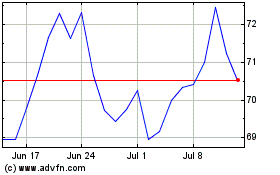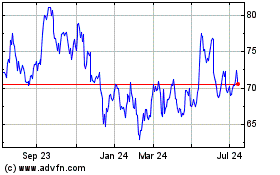U.K. Makes U-Turn on Huawei After U.S. Pressure
July 14 2020 - 8:16AM
Dow Jones News
By Stephen Fidler and Max Colchester
LONDON -- The British government said it would bar telecom
companies from purchasing new equipment made by China's Huawei
Technologies Co. and gave them until 2027 to remove its technology
from their 5G networks, a sharp about-face that marks a significant
victory for the U.S.
The decision follows new U.S. restrictions on the sale of Huawei
computer chips and comes amid a broader deterioration of relations
between the U.K. and China, most recently relating to China's
imposition of a new security law over the former British colony of
Hong Kong.
Oliver Dowden, the British minister in charge of digital issues,
told the House of Commons on Tuesday that new purchases of Huawei
5G equipment would be barred from the end of this year and that the
Chinese company's gear would have to be stripped out of British
networks by 2027. As recently as January, the U.K. said it could
mitigate the risk of Huawei equipment in its networks.
The U.K is launching a consultation on when to ban the purchase
of Huawei kit from the country's fiber optic network. This will be
followed by a transition period that isn't expected to exceed two
years.
The move comes as U.S. pressure builds on European governments
to shut Huawei out of their 5G networks. Senior U.S. officials, led
by U.S. national security adviser, Robert O'Brien, and his
counterparts from Italy, Germany, France and the U.K. are meeting
in Paris this week.
The Trump administration ratcheted up its pressure on Huawei in
May, using export rules to bar global suppliers from selling the
company's chips produced using U.S. tools. British officials said
this raised questions about the quality of Huawei kit in the
future.
U.S. officials have long said Beijing could direct Huawei to
sabotage or spy through 5G networks, which promise to provide
superfast wireless speeds for coming technologies such as
self-driving cars. Huawei and the Chinese government reject the
charges.
Victor Zhang, head of Huawei's U.K. operations, said in June
that the company had a proven record and was happy to work with the
British government regarding "any concerns they may have and to
continue the working relationship we have had for the last 10
years." Huawei has secured a significant U.K. market share,
resulting from telecom providers' views of the company's equipment
as high-quality and inexpensive.
British relations with China have rapidly soured since Prime
Minister Boris Johnson gave Huawei the green light to build part of
its 5G network in January this year. At the time, government
officials said the risks related to Huawei could be mitigated, with
the equipment maker permitted to only have a maximum 35% market
share of the 5G network and to be excluded from its "core," where
much of the information on the network is processed.
The U.K.'s National Cyber Security Centre, part of the nation's
GCHQ electronic intelligence agency, launched a new review of
Huawei triggered by the U.S. export bans in May. The swift policy
reversal played out during the coronavirus pandemic.
The decision is expected to fuel broader discussions about how
the U.K., U.S. and other allies can wean themselves off Chinese
technology and production, an issue underscored in recent months by
reliance on Chinese-made medical supplies for hospitals and
caregivers.
Canada remains the lone country in the Five Eyes intelligence
alliance -- which also includes the U.S., U.K. Australia and New
Zealand -- that has yet to decide whether Huawei equipment can be
used in the domestic 5G network.
British telecoms executives have said that imposing a rapid
deadline to tear out Huawei gear from their networks would lead to
coverage blackouts for customers, cost billions of pounds and delay
the introduction of 5G.
Senior executives from Vodafone Group PLC and BT Group PLC told
a parliamentary committee last week that a five-to-seven-year time
frame would be needed to remove Huawei equipment to avoid
disruption. But a group of Conservative lawmakers has been pressing
the government to remove the equipment at a faster pace.
--Jenny Strasburg contributed to this article.
Write to Stephen Fidler at stephen.fidler@wsj.com and Max
Colchester at max.colchester@wsj.com
(END) Dow Jones Newswires
July 14, 2020 08:01 ET (12:01 GMT)
Copyright (c) 2020 Dow Jones & Company, Inc.
Vodafone (LSE:VOD)
Historical Stock Chart
From Mar 2024 to Apr 2024

Vodafone (LSE:VOD)
Historical Stock Chart
From Apr 2023 to Apr 2024
